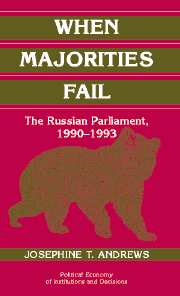Book contents
- Frontmatter
- Contents
- Acknowledgments
- 1 Introduction
- 2 Cycling in Action: Russia's Constitutional Crisis
- 3 Cycling and Its Consequences: A Theoretical Framework
- 4 Institutional Design and Implications for Majority Rule
- 5 Issue Dimensions and Partisan Alliances
- 6 The Structure of Preferences
- 7 Legislative Instability
- 8 The Dynamics of Agenda Control in the Russian Parliament
- 9 Implications of Disequilibrium in Transitional Legislatures
- References
- Index
9 - Implications of Disequilibrium in Transitional Legislatures
Published online by Cambridge University Press: 02 September 2009
- Frontmatter
- Contents
- Acknowledgments
- 1 Introduction
- 2 Cycling in Action: Russia's Constitutional Crisis
- 3 Cycling and Its Consequences: A Theoretical Framework
- 4 Institutional Design and Implications for Majority Rule
- 5 Issue Dimensions and Partisan Alliances
- 6 The Structure of Preferences
- 7 Legislative Instability
- 8 The Dynamics of Agenda Control in the Russian Parliament
- 9 Implications of Disequilibrium in Transitional Legislatures
- References
- Index
Summary
When I began the project that led to this book, my primary motivation was to answer two seemingly unrelated questions: (1) Why did Russia's first competitively elected legislature become embroiled in a confrontation with the Russian president that led ultimately to its own demise? (2) Is cycling an empirical phenomenon that bears on transitional democracies?
As a student of Russian politics, I found the first question puzzling. Because the Russian legislature lost its confrontation with President Yeltsin – after all, the president disbanded the legislature on September 22, 1993, and all the legislative members lost their jobs – it is hard to make sense of the parliament's yearlong preoccupation with reducing executive power. During 1993, the country's economy continued to shrink, organized crime increased, and much of the military went unpaid. In short, there were many problems facing the new democracy, but the country's representative institution ignored these problems and did its best to prevent the president from attending to them as well. Even stranger, when given the opportunity to pass a new constitution that would have preserved their own jobs as well as strengthen the powers of the legislature vis-à-vis the executive branch, the parliament in conjunction with the Congress could not do so.
As a student of legislatures, I felt that the second question represented a gaping hole in the formal theory of legislatures. The phenomenon of cycling is of central theoretical importance to formal scholars of legislatures.
- Type
- Chapter
- Information
- When Majorities FailThe Russian Parliament, 1990–1993, pp. 248 - 258Publisher: Cambridge University PressPrint publication year: 2002

